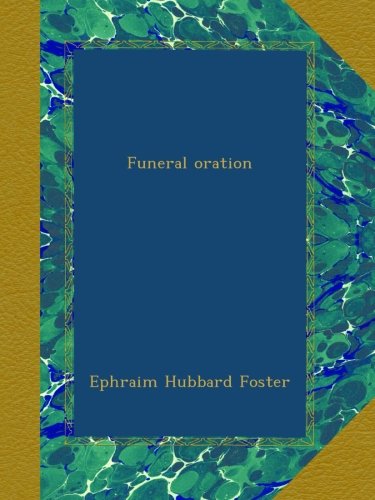Background
Ephraim Hubbard Foster was born on September 17, 1794 near Bardstown, Kentucky, the son of Ann (Hubbard) and Robert Coleman Foster, who in 1797 moved to the neighborhood of Nashville, Tennessee.



(This book was originally published prior to 1923, and rep...)
This book was originally published prior to 1923, and represents a reproduction of an important historical work, maintaining the same format as the original work. While some publishers have opted to apply OCR (optical character recognition) technology to the process, we believe this leads to sub-optimal results (frequent typographical errors, strange characters and confusing formatting) and does not adequately preserve the historical character of the original artifact. We believe this work is culturally important in its original archival form. While we strive to adequately clean and digitally enhance the original work, there are occasionally instances where imperfections such as blurred or missing pages, poor pictures or errant marks may have been introduced due to either the quality of the original work or the scanning process itself. Despite these occasional imperfections, we have brought it back into print as part of our ongoing global book preservation commitment, providing customers with access to the best possible historical reprints. We appreciate your understanding of these occasional imperfections, and sincerely hope you enjoy seeing the book in a format as close as possible to that intended by the original publisher.
https://www.amazon.com/Funeral-oration-Ephraim-Hubbard-Foster/dp/B009RGUWDI?SubscriptionId=AKIAJRRWTH346WSPOAFQ&tag=prabook-20&linkCode=sp1&camp=2025&creative=165953&creativeASIN=B009RGUWDI
Ephraim Hubbard Foster was born on September 17, 1794 near Bardstown, Kentucky, the son of Ann (Hubbard) and Robert Coleman Foster, who in 1797 moved to the neighborhood of Nashville, Tennessee.
At the age of nineteen Foster graduated from Cumberland College (later the University of Nashville). He then studied law in the office of John Dickinson.
In the Creek War he served as secretary to Andrew Jackson. He studied law in the office of John Dickinson in 1817. Until his entrance into politics his firm had, perhaps, the most lucrative practise in the state.
From 1827 to 1835 he was three times elected to the Tennessee House of Representatives. Twice he was unanimously chosen speaker of the house.
In 1833 he opposed John H. Eaton, John Bell, and Felix Grundy in a long and bitter contest for election to the United States Senate. On the fifty-fifth ballot Grundy was chosen.
In the presidential campaign of 1836 Foster deserted the leadership of Andrew Jackson and gave his support to Hugh Lawson White. Upon the resignation of Felix Grundy from the Senate to enter Van Buren’s cabinet, he received the executive appointment to the vacancy for the 1838-39 session.
For the six-year term, beginning in 1839, he had already defeated William Carroll, but he saw no service under this election. The succeeding Democratic legislature instructed the state’s Whig senators to support the measures of the national Democratic administration. Foster resigned immediately (November 15, 1839), and Grundy defeated him for the vacancy thus created.
Four years later, however, upon the death of Grundy, he defeated William Carroll for the term ending in 1845. This vote placed him on the defensive in his gubernatorial campaign of 1845.
Chosen by the Whigs after other leaders had declined the nomination, he conducted a vigorous campaign against his Democratic opponent, Aaron V. Brown, but was defeated by less than two thousand votes. This ended his political career.
Ephraim H. Foster died in 1834 and was buried in the old City Cemetery in Nashville.
Ephraim Foster was one of the most popular members of the Nashville bar. His chief achievement came in 1838, when he was appointed as a Whig to the United States Senate to fill the vacancy caused by the resignation of Felix Grundy, serving until 1839 and was reelected to the United States Senate, serving (1843-45). His most notable act in the Senate was to vote against the admission of Texas into the Union, on the specious plea that though he favored admission the resolution under consideration conceded too much to Northern Abolitionists. From 1827 to 1835 he was also elected as a member of the Tennessee State House of Representatives three times.
(This book was originally published prior to 1923, and rep...)
Ephraim Foster became one of the most prominent Whig leaders of the state.
Virile, quick tempered, deeply affectionate, and strongly partisan, he became one of the most popular members of the Nashville bar.
While studying law in the office of John Dickinson, Ephraim Hubbard Foster married in 1817 his wealthy widow, Jane Mebane Lytle. His only daughter Sallie married Benjamin F. Cockrill, the son of planter Mark R. Cockrill.
1830–1849
1833–1895
1819–1851
1792–1847
1770–1850
1820–1889
1809–1887
1806–1878
1798–1876
1769–1844
American politician
